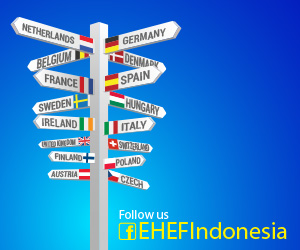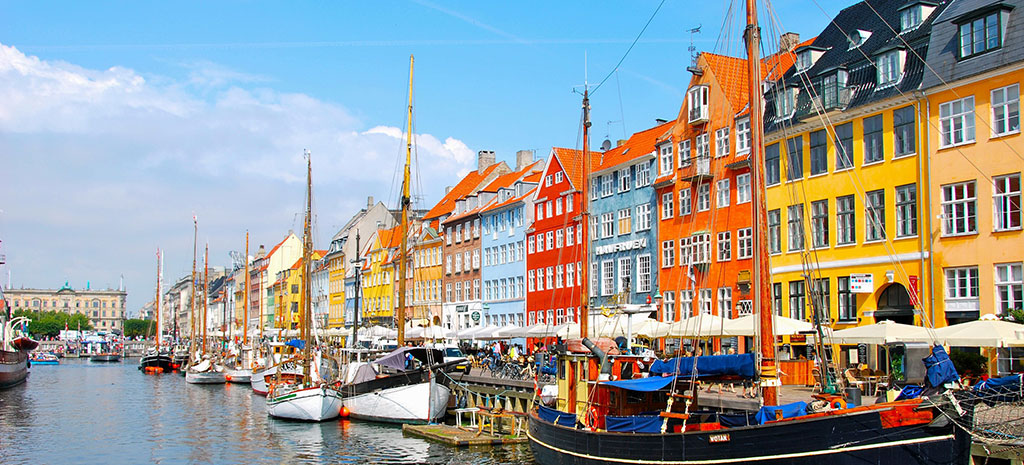
Study in Denmark
Last edited on 04 Mar 2026
Welcome to Denmark!
Denmark is a nation situated in Scandinavia in northern Europe. It is the southernmost of the Nordic countries and consists of the greater part of the Jutland Peninsula, bordered to the South by Germany. The population amounts to 5.6 million people and the capital, Copenhagen – often called the Paris of the North – has an old, historical center and a large network of pedestrian streets, bicycle paths, and parks. Meanwhile Aarhus, Denmark's second city is an European City of Culture in 2017. The official language of Denmark is Danish, but most people also understand and speak English. Denmark has much to offer. A high quality of living is a characteristic feature of Danish society, which combines social security, a clean environment and an attractive business climate with high standards in education and research, and an international outlook. In Denmark, you will enjoy the informal atmosphere in class at university, an international approach to education as well as a large array of progressive study programs.
Higher Education System
Higher education institutions in Denmark consists of Universities offering research-based undergraduate and post graduate programmes (Bachelor, Master and PhD), University Colleges offering undergraduate programmes (Professional Bachelor and Diploma programmes) and finally Academies of Professional Higher Education (erhvervsakademier) offering academy programmes (2-2½ years) and bachelor top-up programmes (1½ years).
Danish universities and other higher education institutions offer a wide selection of degree programmes and individual courses taught fully in English. It makes it easy for international to find attractive study opportunities. Each institution is responsible for admission and you can get further information about entrance qualifications, supplementary tests and the possibilities of transfer of credits from the admission offices at the institutions. The quality of higher education is assured in many ways.
Higher education in Denmark is regulated and fully financed by the state. There are no private institutions of higher education. All public educational institutions are accredited and evaluated on an ongoing basis. The institutions have a high degree of autonomy but must at the same time follow the national regulations on teacher qualifications, award structures and external evaluation of their study programmes. This system is a way of setting national standards for higher education, thus ensuring high quality at all institutions. All institutions use the European credit transfer system, ECTS, facilitating international credit transfer.
Denmark currently hosts almost 23,000 international tertiary level students – including almost 200 from India according to UNESCO 2012 assessment. The Danish higher education system has a good reputation around the world, and 3 Danish universities featured in the Global Top 200 of the Times Higher Education World University Rankings 2015-2016 – The University of Copenhagen ranked 82, Aarhus University ranked 106, and the Technical University of Denmark ranked 167. Meanwhile, Aalborg University and the University of Southern Denmark are ranked in the Global Top 400. Denmark has one business school, Copenhagen Business School, which is ranked 1st in the world in Eduniversal’s 5 palmes league of business schools and the THE World University Ranking 2015-2016 Top 250.
Universities in Denmark
Student Cities in Denmark
Copenhagen
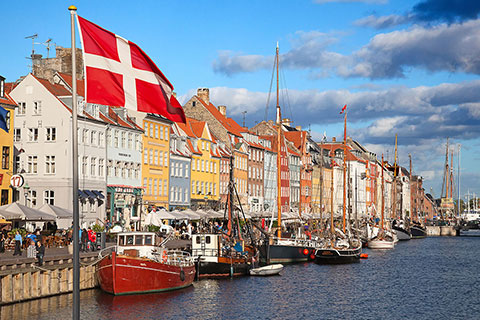
Denmark’s capital city, Copenhagen, is one of the most celebrated cities in Europe, and is currently ranked joint 27th in the QS Best Student Cities index. The heady combination of romantic spires and edgy new architecture, the vibrant and colorful cultural scene, innumerable cafés and bars, and the consistently high quality of life enjoyed by its residents all add to its appeal. It’s not the cheapest place in the world to study, but it’s unlikely to set you back more than other capitals such as London or Paris.
As well as the University of Copenhagen, Denmark’s oldest and highest-ranked university, Copenhagen is also home to the Technical University of Denmark, ranked 109th in the world, as well as Copenhagen Business School and the IT University of Copenhagen.
Aarhus
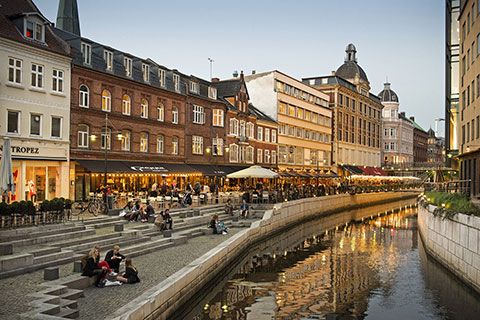
An important port town located on the country’s main peninsula, Aarhus is Denmark’s second-largest city and is home to the third highest-ranked Danish university, Aarhus University (117th in the QS World University Rankings 2016/17). Like Copenhagen, it has a rich history and a stunning historical quarter, featuring not one but two 13th century cathedrals, as well as a rich cultural scene and plenty of nightlife, courtesy of its large student population. Aarhus has also been rated as one of the happiest cities in the world by National Geographic.
Odense
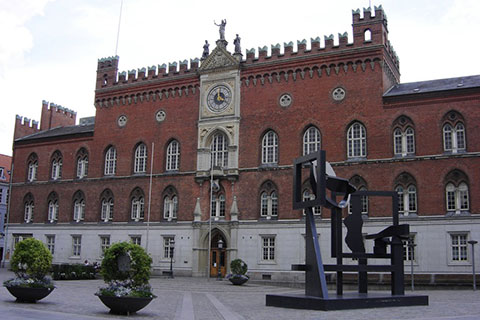
Located on the island of Funen, which sits between main peninsula Jutland and largest island Zealand, Odense is Denmark’s third most populous city. It is noteworthy for being the birthplace of famous Danish author Hans Christian Andersen, known for his innovative fairy tales, and is also rich in Viking-era history. You can see the skeleton of Saint Canute, the country’s patron saint, on display in the city’s historic cathedral. University-wise, Odense is the location of the main campus of the University of Southern Denmark, ranked joint 390th in the QS World University Rankings 2016/17, and this relatively small city is infused with the vibrant life of its the large student population.
Aalborg
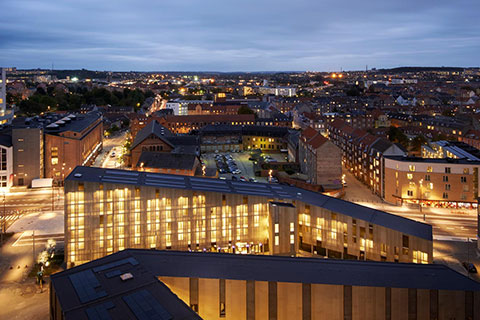
An industrial city towards the north of Jutland, Aalborg is home to Aalborg University, which is ranked joint 374th in the QS World University Rankings 2016/17. Combining historical architecture with a more industrial and contemporary feel, one of Aalborg’s major attractions is Jomfru Ane Gade – a long street which is the center of the city’s thriving café culture and nightlife. The waterfront area has recently been redeveloped, and the city also has a new major concert venue – Musikkens Hus. Aalborg is also home to the largest carnival in Northern Europe, held annually in May
Application, Fees and Visas in Denmark
Application, fees, and visa
Regarding visa please visit the following web pages:
https://www.nyidanmark.dk/en-us/coming_to_dk/studies/studies.htm
Fees and funding Fees and funding
If you a citizen of any other country within the EU/EEA (or Switzerland), you will be treated almost exactly the same as local students. This means that universities in Denmark are free to attend, at all levels, for all EU/EEA students. If you are from outside the EU/EEA, you will be required to pay fees, which on average cost €6,000-16,000 per year (~US$6,560-17,590). Some scholarships are available, offered by individual Danish universities and also via public initiatives.
Accommodation
Danish universities do not have a tradition for on-campus housing. Most students live in student halls of residences situated some distance from campus. An efficient public transport system also makes it easy to travel between your residence, campus and the city centre.
Types of accommodation
Some international students prefer to rent a room or a sub-let from a Danish student or landlord. Student halls of residence is also an option. Others rent an apartment or a house, which they share with friends. Whether you choose to live in a student residence, apartment or house you will have to cater for yourself. Cleaning and doing your laundry are also your own responsibility.
Student halls of residence (‘kollegier’)
Student residences offer accommodation in a communal environment. This kind of living may be particularly suitable for international students who have just arrived and do not know anyone yet. Besides, the rent for a room is generally cheaper than that of a private room.
Indonesian Student association in Denmark (PPI Denmark)
Perhimpunan Pelajar Indonesia Denmark (PPI Denmark) is an Indonesian student organization for Indonesia youth who are studying in Denmark. Members of PPI Denmark consist of undergraduate, graduate and postgraduate students. PPI Denmark is created to foster a sense of unity among Indonesian students. Developing the potential and creativity of members. Organizing and fostering organizational relationships both internally and externally. Conduct capacity-building activities of individual, groups between Indonesian students in Denmark. Provide information about Denmark, especially education, to Indonesians and vice versa. Now PPI Denmark has 84 active members which spread throughout Denmark.
Learn more about PPI Denmark in
Website : www.ppidenmark.dk
Facebook : PPI Denmark
Twitter : @ppidanmark
Internship opportunities
At most universities in Denmark it is possible, during either the bachelor or the master degree, to take a semester aboard. A semester abroad could be either spend as an internship or exchange to another university in the world. The requirements for getting full ECTS points when taking a semester aboard varies from university to university, but the study administration is always to be asked for advice about the opportunities the specific university provides.
The Embassy of The Republic Indonesia in Denmark
The Embassy of the Republic of Indonesia (often abbreviated as "KBRI") is the main representative office of Indonesia in a foreign country with diplomatic relations with Indonesia and headed by an ambassador. KBRI Denmark is located in Copenhagen, Ambassador Indonesia to Denmark is Mr Ibnu Said.
Contact Information
Kedutaan Besar Republik Indonesia - Kopenhagen
Ørehøj Alle 1, 2900 Hellerup, Denmark
Telephone: +45 39 62 44 22
E-mail: unitkomkph@kbricph.dk
Fast fact
- Constitutional monarchy; current head of state is Queen Margrethe II
- Democracy with unicameral legislature (the Folketing)
- Head of government is Prime Minister, currently Lars Løkke Rasmussen
- As well as Denmark proper, which consists of the main peninsula Jutland and 406 islands (the biggest of which is Zealand), the Kingdom of Denmark also includes the Faroe Islands and Greenland.
- Capital city: Copenhagen.
- Member of the European Union, and joins Sweden and Norway as part of Scandinavia (which along with Iceland and Finland constitute the Nordic countries).
- The Danish flag (the Dannebrog – red with a white cross) is the oldest flag currently in use.
- Denmark is the world’s fifth largest exporter of food (Danish bacon probably has a lot to do with this).
- Official language: Danish or Dansk, but German, Greenlandic and Faroese are also recognized and a large proportion of Danes speak English as a second language
- Currency: Danish Krone (DKK)
- International dialing code: +45
- Central European Time (UTC+1), switching to Central European Summer Time in summer (UCT+2)
Bagaimana studi di Denmark dapat mengubah hidup mu? Sebagai mahasiswa internasional di Denmark, Anda akan mempelajari pendidikan kelas dunia di bidang-bidang seperti teknik, ilmu hayati, ilmu sosial dan Teknologi Informasi. Di Denmark, Anda berada dalam lingkungan yang aman, ramah dan inovatif.
Sistem pendidikan tinggi di Denmark difokuskan untuk menghasilkan solusi bagi dunia nyata. Oleh karena itu, metode pembelajaran yang tradisional dikolaborasikan dengan dunia industri, yang kemudian diharapkan dapat melejitkan keterampilan siswa untuk menggunakan apa yang telah mereka pelajari di ruang kelas dan mengubah pengetahuan baru menjadi solusi inovatif dan kreatif. Anda akan dipenuhi oleh lingkungan belajar dengan fasilitas terkini dimana dapat belajar dari pakar industri dan magang di organisasi yang diakui secara internasional.
Jangan lupa bersantai sejenak, Denmark menjadi pintu gerbang ke negara-negara Skandinavia lainnya dan seluruh Eropa. Berlin hanya berjarak 1 jam penerbangan. London dan Paris bisa ditempuh dalam waktu kurang dari dua jam. Barcelona, Roma, Wina dan Praha dapat ditempuh dalam beberapa jam dengan pesawat terbang!
Danish government scholarships for highly qualified non-EU/EEA students
Focus Scholarship: Sarjana dan Magister
Competition: Seluruh Dunia (non EU/EEA)
Scholarship Coverage: Beasiswa penuh dan parsial
Institusi pendidikan tinggi Denmark menyalurkan beasiswa pemerintah setiap tahun untuk mendanai siswa berprestasi dari negara-negara non-EU / EEA dan Swiss. Beasiswa tersebut sepenuhnya diurus oleh institusi pendidikan tinggi Denmark, yang akan melakukan proses seleksi kandidat penerima beasiswa. Beasiswa pemerintah Denmark dapat diberikan dalam bentuk keringanan biaya kuliah dan / atau bantuan sebagian atau keseluruhan biaya hidup. Untuk informasi lebih lanjut tentang beasiswa pemerintah Denmark, silakan berkonsultasi dengan dari institusi pendidikan tinggi yang Anda tuju.
Criteria
- Warga negara luar Uni Eropa, Kawasan Ekonomi Eropa atau Swiss
- Terdaftar dalam program pendidikan tinggi (full degree)
- Menunjukan izin tinggal untuk studi di Denmark
Doctorate Scholarship (PhD position) in Danish Institutions of Higher Education
Mengikuti gelar PhD berarti Anda telah berkomitmen untuk menghabiskan setidaknya empat tahun untuk melakukan penelitian dan menulis disertasi. Selama empat tahun ini, kandidat PhD bekerja sama dengan erat bersama pengawasnya. PhD tidak dianggap sebagai sebuah studi, namun riset serius dan kandidat PhD di Belanda seringkali dalam keadaan bekerja dan memperoleh penghasilan (gaji). Daftar berikut adalah posisi peneliti yang sedang dibutuhkan di universitas ternama di Denmark. Untuk informasi lebih lanjut silahkan mengakses situs resmi universitas:
- Danmarks Tekniske Universitet (Doctorate)
- University of Copenhagen (Doctorate)
- Aalborg University (Doctorate)
- University of Southern Denmark (Doctorate)
- Aarhus University (Master and Doctorate)
- Copenhagen Business School (Master)
Anda juga bisa mendapatkan kesempatan beasiswa untuk mendapatkan gelar Master di Copenhagen Business School.







